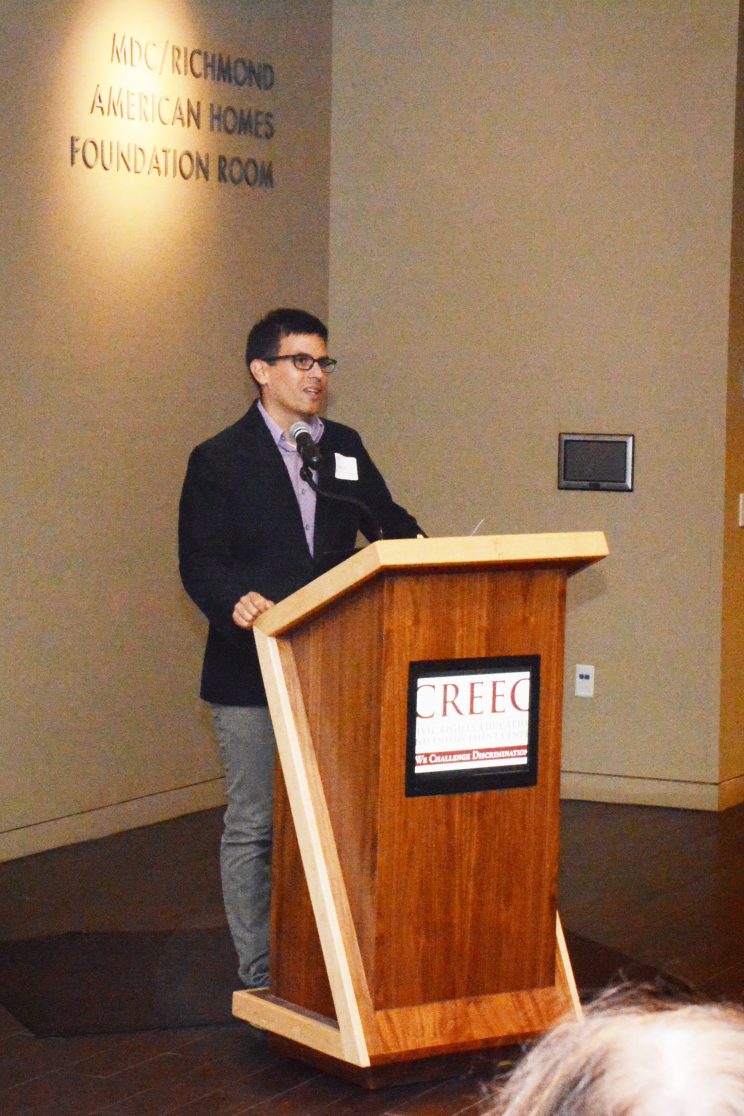Remarks delivered at Disability Law United’s 2019 Annual Event by Challenging Discrimination award recipient, César Cuauhtémoc García Hernández
Written by César Cuauhtémoc García Hernández
What an immense honor it is to be recognized in this way. I am humbled to celebrate the work that Disability Law United does and to remember the people who they advocate alongside. Among Disability Law United’s clients are people like Edelberto García Guerrero, who lives at the Aurora immigration prison, while his wife and children remain in Utah, and Stephenson Teneng, an asylum seeker who was surrounded by barbed wire in the California desert while ICE claimed he was not being punished. To Disability Law United, their stories are worth telling because they should not be happening.

We live in a moment in which the law is being subverted and traditions shoved aside in the service of suffering. In various parts of the world, including the United States, the lived reality of migration has been turned upside down by the cruelty of the power of policing pressed on law. In the United States, we see the inhumanity of the prison’s steel doors and around-the-clock surveillance rip through conversations about immigration law and policy. Despite the intensity of migration policing, advocates like Disability Law United are finding inspiration in numbers and strength in the creative potential of imagination. As a teacher, a lawyer, and a writer, to be in their company is to be reminded that words can wound or words can salve, but whatever effect they have, words always matter.
The freedom-dreaming intellectual bell hooks reminds us that “intellectual work is a necessary part of liberation struggle.” Indeed, it must be because in dreams come visions of the impossible. If we can’t imagine the impossible, we can never make it real. Instead, we will be relegated to trying more of the same policy responses that led to large-scale confinement of migrants.
I begin my next book, Migrating to Prison: America’s Obsession with Locking Up Immigrants, with James Baldwin asking us to imagine more than what exists today. In The Fire Next Time, his powerful indictment of white supremacy’s pernicious ability to sit at the base of life in the United States of America, Baldwin wrote: “I know that what I am asking is impossible. But in our time, as in every time, the impossible is the least that one can demand.” Rooted in the racial injustices of the mid-twentieth century, Baldwin’s words are no less relevant today. He dares us to imagine what does not exist—even to imagine that for which words do not exist.
In recent years, human bondage has become increasingly commodified. Through hundreds of immigration prisons nationwide, ICE trades with GEO Group and CoreCivic. The federal government sends its money to private prison corporations and in exchange they lock up bodies, hidden behind the narrow windows of facilities from suburban Denver to the Sonoran Desert. Sometimes people are confined for so long that it seems as if the key has been lost. Instead, it is our moral compass that has skewed to the point that policymakers do not ask whether it is right to jail children. Instead, they ask whether children ought to be detained alone or with their parents.
The foundational legal safe harbor of asylum is being pushed to the brink of collapse, increasingly restricting human life to the lucky. This summer a father reached the Río Grande River ready to plead for his family’s safety with U.S. officials, only to be turned away. The family was pushed toward the river’s dangerous waters. When the father and his daughter waded across, neither would emerge alive. The world witnessed images of father and daughter dead on the riverbank, Valeria’s arm tucked inside Óscar’s shirt and wrapped around his neck, searching for the safety that would not come.
Ours is a world where the accident of birth often dictates the fruit that life reaps, where walls and fences, borders, bullets, and wealth often bring excess to our own plates while denying others the basic necessities of life. Ours is a world in which raw power tipped in the poisonous quiver of racism is returning to its traditional place at the head of the table. In moments like this, law too easily becomes a blunt instrument of indignity wrapped inside a whirlpool of myopic platitudes pitting order in a mythical fight against chaos. We must police and imprison, policymakers suggest, because if we do not the entire edifice of our reality will come tumbling upon us.
Law wielded as a weapon forces us to forget that there is also hope in law, that law can be a radical tool of resistance and a great moral compass. But for law to reach its potential, those of us who play with law, those of us trained as its wordsmiths, must do more than hope for justice. We must be willing to dream of one day living in a world where violence is not a feature of life, where premature death is but a tale from the past, and where the clank of steel doors and the isolation of barbed wire are nothing more than a nightmare from which it is possible to awaken.
I am humbled to stand with Disability Law United and with you as we close our eyes, not to avoid the trauma around us, nor to soften the pain of the blows we receive. We close our eyes to listen to the morning fog evaporate as the first rays of sunshine peer over the horizon, marking a new day. “On the seventh day… Joshua commanded the army, “Shout! For the Lord has given you the city!… When the trumpets sounded, the army shouted, and at the sound of the trumpet, when the men gave a loud shout, the wall collapsed…and they took the city.” In the biblical story of Jericho’s fall, the impossible came to pass because it was right that it be so and because Joshua’s followers dared to dream of a new beginning. Likewise, it is right that we embrace migrants, that Disability Law United advocates on their behalf, not despite their ordinariness, but because of it, and that collectively we dare to imagine what was previously unthinkable. “Sometimes we have to do the work even though we don’t yet see a glimmer on the horizon that it’s actually going to be possible,” writes Angela Davis.
We are living in a time of nightmares, some more easily forgotten then others. If nightmares can become reality, then why can’t dreams?
